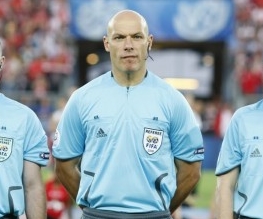The Referees

How can a few crucial minutes in a football match affect the lives of a family? How do the “men in black” feel when they are attacked by supporters? The Referees follows the sporting lives of several professional football referees at the EURO 2008 championship and attempts to answer those questions. A look at the day-to-day organisation behind a major football tournament focusing on the controversy and private turmoil experienced by refereeing officials. Yves Hinant’s documentary is a study of the personality required when the eyes of the world are watching and scrutinising your every decision.
A surprising positive of The Referees is that even if you’re not a football fan, you’ll find something to enjoy in this documentary. After a run on the festival circuit, the film is positively ancient (the tournament they’re documenting occurred three years ago); but the concerns about the abuse referees suffer from and the lack of respect afforded to them is an issue that simply won’t go away. Following referees from day-to-day may seem unexciting but the documentary dives into the inner circle of officiating, granting unheard of access to what happens behind the scenes.
The film captures its subjects without pretension, without glamorizing them or adding more importance to their roles. They’re not playing caricatures or living up to the personas that we (the public) would ascribe to them. In one instance an official makes a mistake leading to a team scoring a disputed goal. The looks on the faces of the officials once they’re back in the changing rooms at half-time is one of anxiety. Each one is aware of the criticism they face and the importance of getting decisions right, which makes their indecision/mistakes compelling. The documentary becomes a revealing look into the life of the men who are granted the task of deciding what’s legal and what’s not, and seeing the fall-out when they get a decision wrong.
The camera is practically invisible, never encumbering on meetings and conversations, giving a strong impression that the footage captured is honest and authentic. A problem with this approach is that it feels slightly rudderless, the camera going to whatever location or character it wants at a moment’s spur. Consequently, in a 77 minute film it doesn’t stay with one character for too long before shifting off to another. It’s a slight complaint and another grumble is that it doesn’t suffice as a fully detailed look into the lives of these men. We never see (and barely hear about) Webb’s life as a sergeant in South Yorkshire police or Rosetti’s work as a director of a hospital in Italy. It’s all about their conduct at the tournament, their role as arbiters on the pitch and its simple premise reduces any fat in terms of added sub-plots. It’s simple and it works even if you feel the film-makers haven’t made the most of the access they’ve been granted.
Coming from someone who watches as much football as he possibly can, even for jaded supporters of the sport, Yves Hinant’s documentary is very watchable. Unlike Zidane: A 21st Century Portrait, it doesn’t attempt to bore its audience to death, leavening proceedings with moments of humour (in one moment Peter Frojdfeldt gives a pep-talk with his shirt off while the people he addresses keep their shirts on) and it doesn’t try to educate its audience on how hard officiating can be, instead letting us judge for ourselves. Many of us may curse and shout at referees but perhaps the best compliment I could pay after watching this film is that you’ll be more likely to keep your tongue-lashing in check and (hopefully) understand that the man in black (or yellow, or blue) can make mistakes too.



Recent Comments